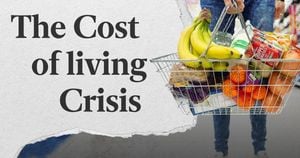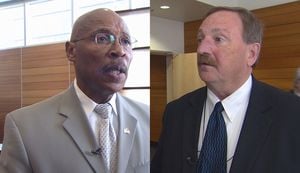Rebecca Hall, well-known for her roles in films such as Vicky Cristina Barcelona and A Rainy Day in New York, has made headlines recently for her retraction of previous statements concerning her collaboration with filmmaker Woody Allen. Originally, Hall had stated she was "profoundly sorry" for working with Allen, especially amid mounting allegations against him, including those from his adopted daughter, Dylan Farrow. She expressed remorse particularly after the surfacing of the #MeToo movement, which inspired many actors to reevaluate their associations with figures accused of sexual misconduct.
Initially, Hall’s decision to apologize can be traced back to 2018, when she was pregnant and felt overwhelmed by the emotional turmoil surrounding Instances of abuse within Hollywood. At the time, she sought to make what she called a "definitive" statement against Allen, but this choice has since left her unsettled. Speaking to The Observer, she reflected on her earlier public statement, saying, “it is very unlike me to make a public statement about anything. I don’t think of myself as an actor-vist. I’m not really cut out for this kind of activism.”
Hall's comments came on the heels of outrage directed toward Allen from several quarters of the entertainment world. The director has consistently denied all allegations of wrongdoing, yet many prominent figures have distanced themselves from him. Notable actors like Mira Sorvino and Greta Gerwig openly expressed regret for past collaborations with Allen, adding pressure on his former cast members to take similar stands.
Looking back, Hall recognized her emotional state played a pivotal role in her initial apology. During her pregnancy, she felt compelled to support the movement and voice solidarity with other women, remarking, “at the time, I could see how my actions had made another woman feel silenced and dismissed.” She even donated her salary from A Rainy Day in New York to the Time's Up legal defense fund, emphasizing her alignment with gender equity and support for survivors.
Fast forward to the present, Hall reflects on her actions with different eyes. She has claimed she no longer believes actors should carry the ethical burden of commenting on their collaborators' morality. She stated, "I don’t regret working with him. He was kind to me and gave me great opportunities." She also emphasized the value of artistry over political statements, asserting, “I wouldn’t say anything – my policy actually is to be an artist. Don’t come out and state your stuff so much. I don’t think it makes me apathetic or disengaged. I just think it’s my job.”
Hall, whose latest project is the BBC drama The Listeners, articulated how the public's response can sometimes overshadow individual intentions. She admitted, “It just became another person denounces Woody Allen and regrets working with him, which is not what I actually said.” This implies she sees her original intent as being misinterpreted within the broader narrative of celebrity accountability.
Contemplation on the events surrounding her career and the public discourse on Hollywood's troubling behaviors reveals the nuances involved when confronting allegations of misconduct. Hall’s experience serves as a reminder of the complexity surrounding discussions of harassment and accountability within the industry.
Apart from her revelations about Allen, the actress also discussed the broader sociopolitical contexts affecting her perceptions, citing the tumultuous atmosphere surrounding both Allen and disgraced producer Harvey Weinstein during the time she issued her original apology. Weinstein's 2017 downfall marked the catalyst for several conversations about sexual harassment and power dynamics within the film industry.
Despite her complicated feelings about working with Allen, Hall's stance now directs focus away from her past statements, urging recognition of the multitudes within stories of survival, artistry, and professional relationships. This increasingly nuanced and introspective view can offer audiences insight on the internal struggles actors face when balancing their professional obligations against personal ethics.
Hall’s remarks highlight the importance of perspective and allow for growth and reconsideration within one’s opinions. This evolution reflects the larger societal conversation about how figures within the arts contextualize their roles and responsibilities—both artistic and moral—amidst shifting cultural landscapes.



